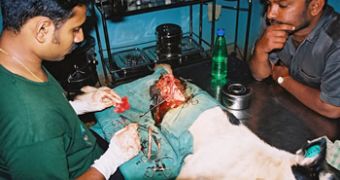For some of us a dog is more important than a human. It is easier to interact with a dog. The animal cannot criticize or underappreciate you. But the more frequent tendency to own a pet has revealed that British vets signal there is an increasing need for a national blood bank for dogs.
What's working for humans can also work for dogs: open-heart surgery, chemotherapy for cancer, hip replacement and cataract surgery, with prices going to $27,300. Nothing about euthanasia.
"When people see what can be done to themselves they want it done to their animals. Costs are rising at twice the rate of inflation because what can be done is getting more and more advanced. Insurance premiums are also rising." said Jerry Davies of the royal college.
"A shortage of blood is the biggest constraint. Blood-banking has the potential to benefit the biggest number of patients if we can get it formalized. But it depends on the owners of large dogs coming forward. If a dog gets hit by a car and needs a blood transfusion there is a problem. In human medicine there would be no second thoughts about giving blood. A blood bank would make a big difference to how much we can do." said Dr Dan Brockman, an expert in veterinary cardiac surgery.
Like humans, dogs display various blood groups and the donated blood must be the same with that of the receiver. 25 % of all dogs have tumors, mostly skin and jaw cancer. This costs $ 8,000-14,000 and it is usually followed by radiotherapy. Dog hip replacement goes to $ 6,000-9,000 and improved knee replacements have appeared. There are even paw prosthesis, made of titanium alloy, covered in plug-in carbon-fiber with patterns mimicking the real paw.
Vets even respond to criticism concerning the ethic issues of these huge amounts of money spent on dogs.
"You could criticize people for buying new cars or new kitchens. It is not relevant. This is people's disposable income, it is not funded from the state. If we stopped giving these treatments to animals it would not change anything in the developing world," said Professor David Argyle of the Royal School of Veterinary Studies in Edinburgh.

 14 DAY TRIAL //
14 DAY TRIAL //